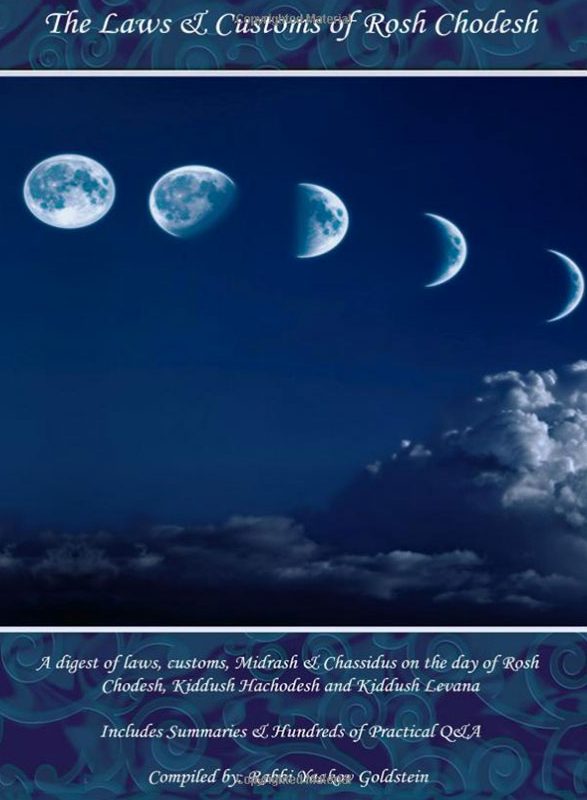This Halacha is an excerpt from our Sefer
Buy me here or on Amazon.com
The Mitzvah:[1]
[Every month] upon seeing the new moon [at night[2]] one is to recite the blessing of “Asher Bemamaro Bara Shechakim”. [It is an obligation every month for one to see the moon in order to say this blessing and doing so is not optional.[3] Thus, one is obligated to go outside periodically to check if the moon is visible in order to say Kiddush Levana.[4]]
The greatness of Kiddush Levana:[5]
Whoever blesses the moon in its proper time is considered to have accepted the face of the Shechina.
The Meaning:[6]
The moon and stars all express G-d’s greatness; His awesomeness and His continued providence and effect in the world. The entire prayer is said only towards G-d and not towards any celestial being, Heaven Forbid. This is the meaning of that we receive the face of the Shechina.
The Reward:[7]
One who says Kiddush Levana does not need to worry that he will die from that day and onwards until the end of the month. This means to say that he will not die an unnatural death that month.
A Segula for finding a Shidduch:[8]
It is a Segula for finding a Shidduch to recite Kiddush Levana with intense concentration and with a congregation.
A Segula for healthy teeth:[9]
Saying Kiddush Levana properly is a Segula for having healthy teeth.
Segula for long life-Maaseh Shehaya:[10]
Kiddush Levana is a Segula for long life.[11] It once occurred that a Jew met a gentile late at night, and the gentile desired to murder the Jew. The Jew saw that the moon was shining and he asked the gentile, as a last request, to allow him to do a Mitzvah of Hashem prior to his death. The gentile agreed and the Jew said Kiddush Levana with a great amount of concentration, and with inner desire to give up his soul for the sake of Heaven. A miracle occurred and when he skipped three times, as is the custom to do during Kiddush Levana, the wind carried him away from the gentile. He never met the gentile again and was hence saved from certain death.
Why don’t we say a blessing on the sun annually just as we say over the moon?[12]
As the Jewish people are compared to the moon and not to the sun.
___________________________
[1] Michaber 426/1
Why is the blessing of Shehechiyanu not recited prior to Kiddush Levana? As in order to recite Shehechiyanu there must be a break of 30 days between the two Mitzvos, and since at times there is only 29 days in between the two Rosh Chodesh therefore Shehechiyanu is not recited. [Kneses Hagedola 422; See Abudarham Shaar 3; M”A 422/5; Kaf Hachaim 422/31] As the entire blessing of Kiddush Levana is on the renewal of the moon. [Shibulei Haleket 167; See Kesav Sofer 34]
[2] Rama ibid
[3] M”A 426/1 regarding a blind person “He is obligated to recite Kiddush Levana”; Kitzur SHU”A 97/7; See Likkut Dinei Rosh Chodesh 12 footnote 3
Ruling of Tur/Michaber: From the wording of the Tur and Michaber ibid it is implied that Kiddush Levana is not an obligation and simply that one who sees the new moon is to say a blessing, but one who does not see has done no wrong. Nevertheless, from the above Poskim it is proven that in truth it is an obligation.
[4] See Otzer Chaim of Rav Chaim of Tzanz Rosh Chodesh 213 “If the moon was not visible until close to the end of its appropriate time, one is obligated to stay awake the last two nights in order to sanctify the moon.”
[5] Sanhedrin 42a; Rambam Brachos 10/16
[6] Peri Megadim 426 M”Z 4; See Hagahos Yaavetz on Sanhedrin 42a
[7] Kaf Hachaim 426/12
[8] Sefer Hamiddos [of Rav Nachman of Breslov]; Kaf Hachaim 426/11
[9] Taamei Haminhagim p. 203 from Reb Yisrael of Ruzhin; Taharas Yisrael 184 Beir Yitzchak 57; Igros Kodesh 11/150; See Likkut Dinei Rosh Chodesh 12 footnote 86 for a story with the Rebbe relating to this Segula
[10] Midrash Talpiyos; Or Chadash, brought in Beir Heiytiv 602/4; Shaareiy Teshuvah 602/4; Elya Raba 602/7; Yifei Lalev 3/2; Kaf Hachaim 426/11
[11] Toras Menachem 1990 4/124
[12] Tzafnaas Paneiach on Rambam Brachos 10/17; See also Levush 426/1 and Aruch Hashulchan 426/2



Leave A Comment?
You must be logged in to post a comment.